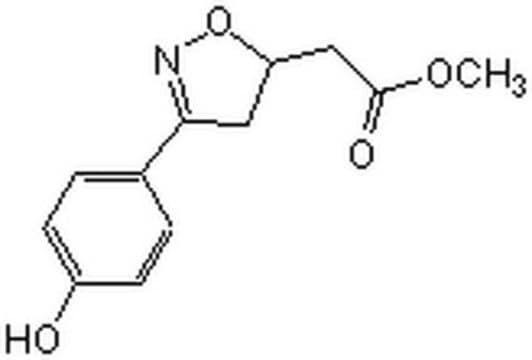SML0472
4-IPP
≥97% (HPLC)
Synonym(s):
4-Iodo-6-phenylpyrimidine
Sign Into View Organizational & Contract Pricing
All Photos(1)
About This Item
Empirical Formula (Hill Notation):
C10H7IN2
CAS Number:
Molecular Weight:
282.08
MDL number:
UNSPSC Code:
12352200
PubChem Substance ID:
NACRES:
NA.77
Recommended Products
Assay
≥97% (HPLC)
form
powder
color
white to beige
solubility
DMSO: 10 mg/mL (clear solution, warmed)
storage temp.
−20°C
SMILES string
Ic1cc(ncn1)-c2ccccc2
InChI
1S/C10H7IN2/c11-10-6-9(12-7-13-10)8-4-2-1-3-5-8/h1-7H
InChI key
ZTCJXHNJVLUUMR-UHFFFAOYSA-N
Application
4-IPP has been used as a macrophage migration inhibitory factor (MIF) in conditioned medium (CM) for in vitro migration assay.
Biochem/physiol Actions
4-IPP is a cell permeable, potent macrophage migration inhibitory factor (MIF) antagonist that covalently modifies MIF N-terminal proline.
4-Iodo-6-phenylpyrimidine (4-IPP) has the potential to be a new anti-polyploid therapeutic agent that may be utilized in patients with thyroid cancer to target polyploid tumor cells. It suppresses osteoclastogenesis by blocking the IMF-κB pathway. 4-IPP can be employed as a therapeutic target for macrophage migration inhibitory factor (MIF) to treat pathologic osteolytic bone diseases and postmenopausal bone loss. It can prevent the development and motility of lung adenocarcinoma cells and can stimulate apoptosis and mitotic death of thyroid carcinomas.
Storage Class Code
11 - Combustible Solids
WGK
WGK 3
Certificates of Analysis (COA)
Search for Certificates of Analysis (COA) by entering the products Lot/Batch Number. Lot and Batch Numbers can be found on a product’s label following the words ‘Lot’ or ‘Batch’.
Already Own This Product?
Find documentation for the products that you have recently purchased in the Document Library.
Customers Also Viewed
Seul-Ki Cheon et al.
Molecular oncology, 12(8), 1398-1409 (2018-06-14)
Although MEK blockade has been highlighted as a promising antitumor drug, it has poor clinical efficacy in KRAS mutant colorectal cancer (CRC). Several feedback systems have been described in which inhibition of one intracellular pathway leads to activation of a
Fabio Bozzi et al.
Journal of experimental & clinical cancer research : CR, 36(1), 16-16 (2017-01-25)
Strategies aimed at obtaining a complete cytoreduction are needed to improve long-term survival for patients with colorectal cancer peritoneal carcinomatosis (CRC-pc). We established organoid models from peritoneal metastases of two naïve CRC patients. A standard paraffin inclusion was conducted to
Ying Zhang et al.
Journal of orthopaedic surgery and research, 15(1), 213-213 (2020-06-11)
Propionibacterium acnes (P. acnes) is a novel pathogenic factor that contributes to cartilaginous endplate (CEP) degeneration. However, the underlying mechanism of P. acnes-induced CEP degeneration remains unclear. The objective of this study is to investigate the underlying mechanism of P.
Tali Lang et al.
Nature communications, 9(1), 2223-2223 (2018-06-10)
Macrophage migration inhibitory factor (MIF) exerts multiple effects on immune cells, as well as having functions outside the immune system. MIF can promote inflammation through the induction of other cytokines, including TNF, IL-6, and IL-1 family cytokines. Here, we show
Yuxin Zhang et al.
Aging, 13(4), 5804-5823 (2021-02-19)
Joint capsule fibrosis caused by excessive inflammation leading to post-traumatic joint contracture (PTJC). Fibroblasts trigger inflammation under the challenge of various proinflammatory cytokines. Macrophage migration inhibitory factor (MIF) is a prominent proinflammatory cytokine involved in inflammation- and fibrosis-associated pathophysiology, we
Our team of scientists has experience in all areas of research including Life Science, Material Science, Chemical Synthesis, Chromatography, Analytical and many others.
Contact Technical Service









